#erp manufacturing software
Explore tagged Tumblr posts
Text
Benefits of Hosting Your ERP

Hosting your ERP manufacturing software in the cloud provides several advantages for businesses. These include cost-efficiency through a pay-as-you-go model, predictable expenses with fixed monthly rates, and the scalability to adjust resources based on your company's changing needs. Additionally, cloud hosting ensures seamless accessibility from anywhere, enhances data security by protecting against attacks, and offers peace of mind with reliable backups and a disaster recovery plan. This makes it an ideal solution for manufacturers looking to streamline operations and improve system reliability.
0 notes
Text
Production Management: Optimizing Manufacturing Processes

In the dynamic landscape of manufacturing, production management plays a pivotal role in ensuring that operations run smoothly, efficiently, and cost-effectively. As industries evolve and competition intensifies, manufacturers must adopt strategies to optimize their production processes. Effective production management not only streamlines operations but also enhances product quality, reduces waste, and improves overall profitability. This blog delves into the technical aspects of production management, focusing on how to optimize manufacturing processes through strategic planning, technology integration, and continuous improvement. For better understanding read our Blog
#ERP Software for Manufacturing Industry#Best erp for Manufacturing Industry#ERP solution for Manufacturing Industry#Leading ERP for Manufacturing Industry#Best Software for Manufacturing Industry#ERP Services for Manufacturing Industry#ERP solutions for Manufacturing Industry#ERP partner for Manufacturing Industry#Trusted ERP Solutions for Manufacturing Industry#Best ERP software for Manufacturing Industry#Best ERP System for Manufacturing Industry#Best ERP Provider For Manufacturing Industry#erp software manufacturing#erp manufacturing software#manufacturing erp software#Top erp software for manufacturing#erp software manufacturing company
0 notes
Text
#erp software for manufacturing industry in india#erp software development company in india#erp software companies in india#custom erp software development#hospital management software in india.#custom erp software development in india#erp manufacturing software#erp software for manufacturing industry#erp software development company#erp software companies
0 notes
Text
Why Infor SyteLine ERP Is Ideal for Mid-Market Manufacturers & Service Providers

When electronics and other mid-market manufacturers want their ERP system to enable growth and create a new competitive advantage, they rely upon Infor Infor SyteLine, also known as CloudSuite Industrial (CSI).
When service and rental equipment providers want their ERP system to enable their growth into world-class service organizations and empower field technicians with data at their fingertips, they also rely upon Infor Infor SyteLine CSI.
We’ve all heard the horror stories of failed ERP implementations so, when manufacturers and service providers want SyteLine ERP successfully implemented—and guaranteed—they rely upon Bridging Business Technology Solutions (BBTS).
An ERP Ideal for Manufacturers
Infor SyteLine is the primary ERP we support because it’s ideal for use by discrete and process manufacturers, especially electronics manufacturers. We also guarantee the success of your Infor SyteLine implementation whether you’re commissioning an ERP system for the first time or replacing your current system, so you can cross the risk of a failed implementation off your list of worries.
SyteLine also can be customized to recognize customer-owned inventory and allocate it only to that customer so you don’t have a unique part number for the same part used by multiple customers. You can also reserve stock for specific products of the same customer or reserve any part in your inventory for a specific order until the order is released.
SyteLine delivers the same type of functionality as SAP and Oracle for a fraction of the cost and headache of implementing a tier 1 ERP system.
An ERP Ideal for Service Providers
Infor SyteLine is the primary ERP we support because it’s a perfect fit for service providers, especially those who rent equipment. We also guarantee the success of your Infor SyteLine implementation. So, whether you’re commissioning an ERP system for the first time or replacing your current system, you don’t have to worry about the disruption of a failed implementation.
Among the biggest benefits of SyteLine for service providers is no longer having to enter data multiple times into disparate systems. Working with common data means that everyone works from the same real-time information, which:
Empowers your service technicians to complete more service orders
Enables your employees to spend more time building relationships with customers
Gives your managers the tools to analyze data and find strategic growth opportunities
SyteLine delivers the same type of functionality as SAP and Oracle for a fraction of the cost and none of the headaches associated with implementing a tier 1 ERP system.
Successful Implementations, Guaranteed
The BBTS team has implemented SyteLine successfully over 165 times since 2013 with a proven ERP implementation process that begins with improving inventory control, planning and forecasting, financial close, and other business processes. SyteLine then standardizes these process best practices and ensures they are followed.
BBTS also provides post-implementation SyteLine enhancements, upgrades, business process improvements, and workflow optimization so you get the most out of your SyteLine investment.
Get Started Today
To determine if SyteLine ERP is right for you, we will connect you with one of our implementation experts as part of a process review. A successful implementation begins with understanding your core business processes, then recreating and evolving them in SyteLine.
Together, we can determine how you will benefit from SyteLine and calculate a target return on investment (ROI) to help justify the move. Contact us to learn more about SyteLine and how we are able to guarantee a successful ERP implementation when so many fail. You can also take advantage of the process review offer.
#erp software#infor#syteline#cloudsuite industrial (CSI)#manufacturing#service providers#customer owned inventory
8 notes
·
View notes
Text
Top 10 ERP software provider in India | shantitechnology
STERP (shantitechnology) is a leading ERP solution provider in Pune, delivering industry-focused ERP for manufacturing companies in Pune. As one of the top 10 ERP software providers in India, we specialize in streamlining operations with cutting-edge manufacturing ERP software in Pune. Trusted among the best ERP software providers in Pune, we empower businesses with seamless automation and efficiency.
Choose STERP – one of the most reliable ERP software companies in Pune for unmatched enterprise solutions!
#ERP for manufacturing company in Pune#Manufacturing ERP software in Pune#ERP solution providers in Pune#India#ERP software providers in Pune#Pune#Mumbai#Maharashtra#ERP software companies in Pune#Top 10 ERP software provider in India#ERP solution#ERP software#Cloud ERP#Business Solution#MSME#SME#business analyst#business analysis#ERP software provider
5 notes
·
View notes
Text
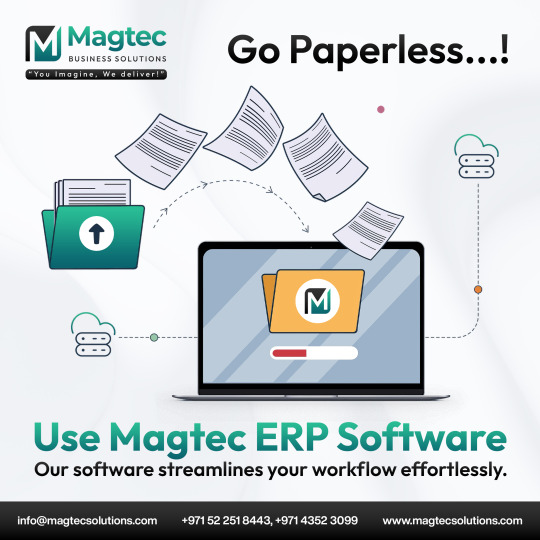
Tired of paper piles? 🚫 Go paperless with Magtec ERP Software! 💻 Streamline your workflow and boost efficiency. It's time to embrace the digital future.
#erp#business#software#management#automation#enterprise#resources#planning#solution#system#cloud#industry#finance#accounting#supplychain#inventory#crm#hr#manufacturing#distribution#retail#healthcare#education#hospitality#smallbusiness#mediumenterprise#largeenterprise#magtecerp#magtec#magtecsolutions
3 notes
·
View notes
Text
ERP Trends 2024: What Engineering and Manufacturing Industries Need to Know
As we navigate through 2024, the landscape of Enterprise Resource Planning (ERP) systems continues to evolve, presenting both opportunities and challenges for engineering and manufacturing industries. Companies in this sector, especially those in key industrial regions like Maharashtra, Mumbai, Pune, and Gujarat, must stay abreast of the latest ERP trends to maintain competitive advantage and operational efficiency. In this blog, we’ll delve into the significant ERP trends of 2024 and their implications for the engineering and manufacturing sectors.
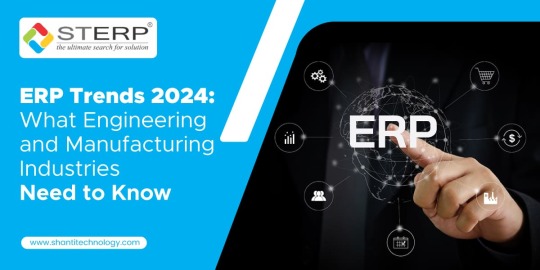
1. Increased Adoption of Cloud-Based ERP Solutions
One of the most significant trends in ERP software for engineering companies in Maharashtra and across India is the shift towards cloud-based solutions. Cloud ERP offers several advantages over traditional on-premise systems, including lower upfront costs, greater scalability, and enhanced accessibility.
Benefits of Cloud-Based ERP:
Cost Efficiency: Eliminates the need for expensive hardware and reduces IT maintenance costs.
Scalability: Easily adjusts to the growing needs of a manufacturing company in Gujarat or an engineering firm in Mumbai.
Accessibility: Provides access to real-time data from anywhere, facilitating better decision-making.
Leading ERP software companies in Pune are increasingly offering cloud-based solutions tailored to the needs of local engineering and manufacturing businesses. These solutions support remote work and ensure business continuity in an increasingly digital world.
2. Integration of AI and Machine Learning
Artificial Intelligence (AI) and Machine Learning (ML) are revolutionizing ERP systems by providing intelligent insights and automating routine tasks. For ERP software for engineering companies in Mumbai, integrating AI can enhance predictive maintenance, optimize supply chain management, and improve production planning.
AI and ML Applications in ERP:
Predictive Analytics: Helps foresee equipment failures and reduce downtime.
Supply Chain Optimization: Enhances demand forecasting and inventory management.
Process Automation: Automates repetitive tasks, freeing up human resources for more strategic roles.
ERP solution providers in Pune are at the forefront of integrating AI and ML into their systems, enabling companies to leverage advanced analytics and improve overall operational efficiency.
3. Emphasis on Cybersecurity
With the increasing digitization of manufacturing processes, cybersecurity has become a critical concern. ERP systems, being the backbone of business operations, are prime targets for cyber-attacks. Engineering and manufacturing companies in regions like Gujarat and Maharashtra need robust cybersecurity measures to protect their sensitive data.
Key Cybersecurity Features:
Data Encryption: Protects data during transmission and storage.
Multi-Factor Authentication: Enhances user authentication processes.
Regular Security Audits: Ensures continuous monitoring and improvement of security protocols.
ERP software for engineering companies in Maharashtra must incorporate these advanced security features to safeguard against data breaches and cyber threats.
4. Enhanced User Experience (UX)
User experience has become a critical factor in ERP adoption and utilization. Modern ERP systems are focusing on intuitive interfaces and user-friendly designs to ensure that all employees, regardless of their technical expertise, can effectively use the system.
UX Improvements:
Intuitive Dashboards: Provide real-time insights and easy navigation.
Mobile Accessibility: Ensures that users can access ERP data on-the-go.
Customization Options: Allow users to tailor the system to their specific needs.
ERP software companies in Pune are prioritizing user experience in their solutions, making it easier for engineering and manufacturing firms to train their staff and increase productivity.
5. Internet of Things (IoT) Integration
The integration of IoT with ERP systems is another trend transforming the manufacturing industry. IoT devices collect vast amounts of data from production lines, equipment, and other operational areas, which can be analyzed by the ERP system to optimize performance.
IoT Benefits in ERP:
Real-Time Monitoring: Provides immediate insights into production processes.
Predictive Maintenance: Schedules maintenance activities based on equipment condition rather than time intervals.
Enhanced Quality Control: Monitors product quality throughout the manufacturing process.
For ERP for manufacturing companies in Gujarat, IoT integration offers a significant advantage by improving efficiency and reducing operational costs.
6. Sustainability and Green Manufacturing
Sustainability is becoming a critical focus for manufacturing companies worldwide. ERP systems are evolving to support green manufacturing practices by tracking and optimizing resource usage, reducing waste, and ensuring compliance with environmental regulations.
Sustainable ERP Features:
Resource Management: Tracks energy and material usage to minimize waste.
Regulatory Compliance: Ensures adherence to environmental laws and standards.
Sustainability Reporting: Provides detailed reports on sustainability metrics.
Engineering and manufacturing companies in regions like Mumbai and Maharashtra can benefit from ERP solutions that incorporate sustainability features, helping them achieve their environmental goals and enhance their corporate reputation.
7. Modular and Flexible ERP Solutions
In response to the diverse needs of engineering and manufacturing firms, ERP solution providers in Pune are developing more modular and flexible ERP systems. These systems allow companies to select and implement only the modules they need, which can be easily scaled and customized as their business grows.
Advantages of Modular ERP:
Cost-Effective: Pay only for the features you need.
Scalability: Easily add new modules as your business requirements evolve.
Customization: Tailor the system to fit specific operational needs.
This trend is particularly beneficial for small to medium-sized enterprises (SMEs) in the engineering and manufacturing sectors, enabling them to adopt ERP systems without the burden of high costs or complexity.
8. Focus on Customer-Centric Manufacturing
ERP systems are increasingly supporting customer-centric manufacturing practices, where production processes are aligned with customer needs and preferences. This approach enhances customer satisfaction and drives business growth.
Customer-Centric ERP Features:
Custom Order Management: Handles unique customer requirements and specifications.
Enhanced CRM Integration: Integrates with customer relationship management (CRM) systems for a holistic view of customer interactions.
Real-Time Order Tracking: Provides customers with real-time updates on their orders.
Manufacturing companies in Gujarat and engineering firms in Maharashtra are leveraging these customer-centric ERP features to improve their service levels and build stronger customer relationships.
9. Advanced Analytics and Business Intelligence (BI)
Advanced analytics and BI are becoming integral components of modern ERP systems. These tools provide deep insights into business operations, helping companies make data-driven decisions and improve performance.
Key BI Features:
Data Visualization: Converts complex data into easy-to-understand charts and graphs.
Dashboards: Offer a real-time overview of key performance indicators (KPIs).
Predictive Analytics: Forecasts future trends based on historical data.
ERP software companies in Pune are incorporating advanced analytics and BI capabilities into their systems, empowering engineering and manufacturing firms to gain a competitive edge through better insights and informed decision-making.
10. Globalization and Localization Support
As engineering and manufacturing companies expand their operations globally, ERP systems must support multiple languages, currencies, and regulatory requirements. Globalization and localization features are essential for companies operating in diverse markets.
Globalization Features:
Multi-Language Support: Accommodates users from different regions.
Multi-Currency Handling: Manages transactions in various currencies.
Compliance with Local Regulations: Ensures adherence to regional laws and standards.
ERP solution providers in Pune and other industrial hubs are enhancing their systems to support global operations, enabling companies to seamlessly manage their international business processes.
Conclusion
The ERP landscape for engineering and manufacturing industries is rapidly evolving, driven by advancements in technology and changing business needs. Companies in Maharashtra, Mumbai, Pune, and Gujarat must stay informed about these trends to leverage the full potential of ERP systems. By adopting cloud-based solutions, integrating AI and IoT, prioritizing cybersecurity, and focusing on sustainability, businesses can achieve greater efficiency, competitiveness, and growth in 2024 and beyond.
For engineering and manufacturing firms looking for the best ERP software for engineering companies in Maharashtra or ERP for manufacturing companies in Gujarat, it is crucial to partner with leading ERP solution providers in Pune who understand the unique challenges and opportunities in this sector. Embracing these trends will not only enhance operational efficiency but also drive innovation and sustainability in the engineering and manufacturing industries.
By staying ahead of these ERP trends, companies can position themselves for success in an increasingly digital and interconnected world. Whether you are an engineering firm in Mumbai or a manufacturing company in Gujarat, the right ERP system can transform your operations and pave the way for a prosperous future.
#ERP software in Vadodara#Manufacturing ERP software in Gujarat#ERP software companies in Vadodara#ERP software providers in Vadodara#ERP for manufacturing company in Gujarat#ERP software#ERP system#cloud ERP#ERP solutions#software development#engineering ERP#management software#engineering services#engineering industry
5 notes
·
View notes
Text
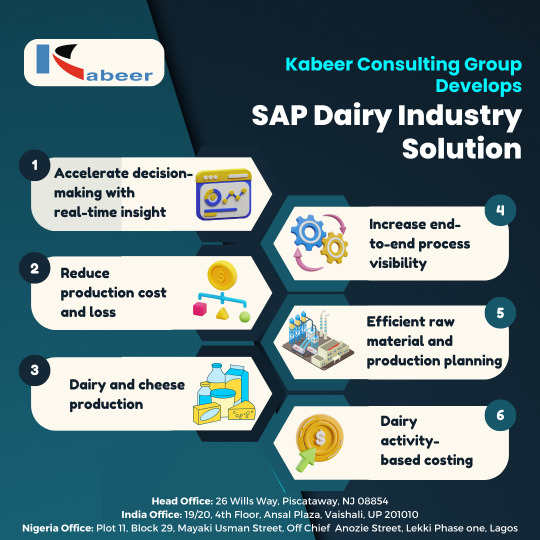
Kabeer_Dairy Industry Add-on for Milk industry!!! SAP B1 ERP Software not only increases efficiency but also helps to improve the quality of products of the Dairy and Milk Products Industry. To help to grow your business, Kabeer has developed an Add-on for the Milk Industry which can help your business to grow and make your organization more effective. Dairy Manufacturing Industries can effectively and efficiently handle every aspect of its business. Take your time to read about how Kabeer help in Dairy & Milk Products Industry.: https://www.kabeerconsulting.com/dairy-industry-solution/
Visit our company website: https://www.kabeerconsulting.com/
#milkindustry#sapbusinessone#dairyindustry#Kabeer#management#erp#implementation#erpsolutions#dairyproducts#milkproducts#manufacturing#business#sap#quality#software#SAPDairySolution#DairyManagementAddOn#SAPERPIntegration#SAPB1Partner#DairyIndustrySolution#DairySolutions#SAPImplementations#SAPAddOns#DairyERP#SAPIntegration
2 notes
·
View notes
Text

Multiple payment methods are integrated into the jewellery inventory management software so that clients can choose the one that is most convenient for them.
Various payment options include credit cards, mobile payments, gift cards, cash, contactless payments, and many more.
#Gold Jewellery Manufacturing software#ERP for diamond jewellery manufacturing#Software for jewellery manufacturing#Jewellery Manufacturing ERP#Chain Manufacturing Software#Jewellery Management System
2 notes
·
View notes
Text
#erp software#cloud erp#erp application#erp consulting services#erp development company#erp development services#erp for small business#erp system#erp integration#crm software#erp for manufacturing
1 note
·
View note
Text
Why Leading Food and Beverage Brands Trust ERP Solutions

Building a strong brand reputation takes years, but it only takes seconds to ruin it. Food and beverage companies in the UK are fully aware of this, which is why they strive to consistently deliver high-quality products that meet regulatory standards set by authorities such as the British Retail Consortium (BRC) and the Food Standards Agency (FSA). However, like any other industry, the food sector faces significant challenges around supply chain management, quality control, cost efficiency, and more. To address these challenges efficiently, food manufacturers require a technological partner—specifically an ERP for food industry system.
Reasons Leading Food and Beverage Brands Rely on Food ERP
Product Innovation – Today's consumers demand continuous innovation. Food and beverage ERP software, like BatchMaster ERP, helps brands introduce new products while maintaining existing lines. This ensures they attract new customers while retaining their loyal customer base.
Inventory Management – The food and beverage sector is uniquely affected by constraints such as shelf-life and product expiry. An ERP for food and beverage automates inventory updates, tracks shelf-life, and manages expiry dates. The auto-replenishment feature ensures that brands always have the optimal inventory levels, reducing waste and capitalising on sales opportunities.
Recipe Management – Recipes are the foundation of the food industry. ERP for food systems allow brands to develop, store, and refine recipes, providing tools to compare various ingredient combinations for optimal market-ready products. Well-managed recipes positively impact customer satisfaction and profitability.
Production Planning – With growing concerns over food waste in the UK, food brands are focusing on improving production planning to reduce waste and minimise financial losses. Food and beverage ERP software optimises production scheduling, streamlines procurement, and facilitates batch control to enhance overall efficiency.
Allergen Management – Food safety is critical, and managing allergens is a significant part of that. ERP systems allow businesses to track allergens, store them separately, and ensure they meet regulatory limits. Additionally, allergen labelling and tracking reduce the risk of recalls and enhance customer trust.
Compliance Adherence – The food and beverage industry must comply with numerous national and international regulations, including those from the FSA and BRC. ERP systems for food industry help ensure brands meet these standards, including nutritional labelling requirements in the UK. This system simplifies compliance by calculating and displaying nutritional values according to specific legal standards.
Cost Calculation – Product cost calculations are often complex. An ERP for food processing simplifies the process, providing detailed cost breakdowns for individual products and formulas. Brands can compare multiple formulas, packaging, and pricing options to select the most profitable and consumer-friendly choices.
Finding Alternatives – To develop cost-effective or innovative products, ERP systems offer "what-if" analysis, allowing brands to test alternative ingredients in formulas. This helps assess the impact on both cost and product quality. For example, sugar-free ice cream can use alternatives that do not significantly increase costs while maintaining the desired taste.
Quality Control – Quality is the foundation of every successful food brand. Food and beverage ERP solutions integrates quality control at every stage of production, ensuring only top-quality ingredients are used, leading to consistently high-quality products.
Product Consistency – Consistency is key to ensuring a reliable customer experience. ERP systems for food and beverage store information about approved suppliers and vendors to guarantee that only the best-quality ingredients are used in production. SOPs stored in the system ensure uniform production processes across all facilities, delivering consistent results in every batch.
Which ERP to Choose for Your Food and Beverage Business?
With numerous options available, BatchMaster ERP stands out. With over four decades of experience, it is trusted by top food and beverage brands worldwide. As a pioneer in formulation management, BatchMaster offers cloud, on-premises, and hybrid deployment models to meet the unique needs of the food sector, including bakery ERP software.
0 notes
Text
Manufacturing ERP power changes the sector like nothing else.
Driven by technical developments and the necessity of more efficiency, the industrial sector is experiencing a seismic change. Manufacturing ERP Software, a potent instrument that combines and automates basic corporate operations, is at the center of this change. From inventory control to factory planning, ERP systems for manufacturers are altering how companies run and helping them to remain competitive in a market going more and more digital.
Why Manufacturing ERP Software is Crucially Important
Manufacturing ERP Software is no more a luxury; it’s a need. Modern manufacturing’s complexity — fluctuating demand, supply chain interruptions, and strict quality standards — requiring a strong system that can simplify processes and offer real-time insights calls for Acting as a key center, ERP for the industrial sector links departments including supply chain, finance, and production to guarantee flawless communication and coordination27. Manufacturing ERP have one of their main advantages in that they improve resource management. Manufacturers can cut waste, lower running expenses, and raise general production by properly distributing resources and optimizing manufacturing schedules. ERP systems such as SAP S/4HANA and Oracle NetSuite, for example, provide sophisticated Material Requirements Planning (MRP) solutions that guarantee resources are supplied as needed, therefore avoiding expensive delays69.
Important Manufacturing ERP Software Characteristics
Selecting an ERP system requires looking for tools catered to the manufacturing industry. These are some crucial features: Strong ERP systems help companies to monitor shop floor activities in real-time, assign resources, and create production schedules. This reduces downtime 79 and guarantees prompt order delivery. Real-time knowledge of supply chain dynamics and inventory levels is absolutely vital. ERP solutions such as Acumatica and Infor Cloud Suite Industrial offer instruments to monitor completed goods and raw resources, so guaranteeing ideal stock levels and so lowering overproduction611. In manufacturing, following exacting quality standards is not negotiable. ERP systems provide industry compliance by use of instruments for recording and preserving quality assurance procedures, therefore ensuring conformity with industry standards79. Manufacturing calls for both direct and indirect cost control. Manufacturing ERP Software enable companies to keep profitability by offering precise financial reporting and cost estimations611. Scalability and Customization: The operational complexity of companies increases along with their size To satisfy evolving needs 911, a smart ERP system should be expandable and flexible.
The ascent of cloud-based ERP systems
Because of their accessibility, flexibility, and affordability, cloud-based ERP solutions are becoming popular in the industrial sector. Cloud ERP lets manufacturers access real-time data from anywhere, therefore enabling cooperation across geographically scattered teams unlike conventional on-site systems15. HostBooks MFG360, a cloud-based ERP system, for instance provides predictive planning capabilities and real-time analytics. All while lowering the demand for significant IT infrastructure, it helps manufacturers to spot bottlenecks, predict machine breakdowns, and make data-driven decisions. Likewise, Acumatica Cloud ERP offers a consumption-based license strategy, which helps small to mid-sized producers find it reasonably priced69. ERP Systems Specific to Industries No two manufacturing companies are the same, nor are their ERP requirements. ERP systems particular to industries such as automotive, food & beverage, and pharmaceuticals meet the particular needs of those sectors. For process manufacturing, for example, Batch Master ERP provides formula management tools and quality control mechanisms catered to sectors such chemicals and pharmaceuticals79. For discrete producers, however, Epicor Kinetic is perfect since it offers real-time monitoring of shop floor activity and sophisticated product configurators. Among aerospace and automotive firms, it is a preferred because of its capacity to create operations lists and custom bills of materials (BOMs79).
Overcoming Obstacles with ERP Deployment
ERP solutions for manufacturing have advantages, but adoption can be difficult. Typical challenges include high upfront expenses, opposition to change, and the difficulty of combining ERP systems with current software. Still, good preparation and execution help to minimize these difficulties511. For instance, Zoho Creator provides a bespoke ERP system that streamlines application. Zoho Creator helps companies get beyond fragmentation and increase operational efficiency by automating processes and centralizing data8. Furthermore, Vyapar offers necessary functionality like job work tracking and GST-compliant invoicing without the complexity10, so providing a reasonably priced substitute for conventional ERP systems.
ERP Software Future in Manufacturing
The realm of ERP systems changes along with technology. Emerging technologies such predictive maintenance, IoT integration, and artificial intelligence-driven analytics will help to define industrial ERP going forward. These developments will help companies to stay ahead of the competition, increase decision-making, and achieve more automation37. For smart manufacturing, SAP S/4HANA for instance combines IoT to enable companies to track equipment performance in real-time and forecast possible failures. In same vein, IFS Applications uses AI-powered insights to improve operational efficiency and streamline supply chain management69. Conclusion industrial Manufacturing ERP Software is no more optional in the competitive and fast-paced industrial scene of today; it is a strategic need. ERP solutions for manufacturing enable companies to flourish in a world going more and more digital by simplifying processes, raising efficiency, and offering real-time analysis. Investing in the correct ERP system will open a world of possibilities and propel steady development regardless of your size — small-scale company or large business. Accept the ability of ERP for the manufacturing sector to transform your company right now! Original Reference - https://medium.com/@txdigitalteam/manufacturing-erp-power-changes-the-sector-like-nothing-else-fd15404324ac
0 notes
Text
5 Key Considerations for Choosing the Right ERP System
Selecting the right Enterprise Resource Planning (ERP) system and choosing the right ERP software Development Company is a crucial decision for any organization. With numerous options available in the market, it's essential to identify the features and functionalities that align with your business needs and objectives.
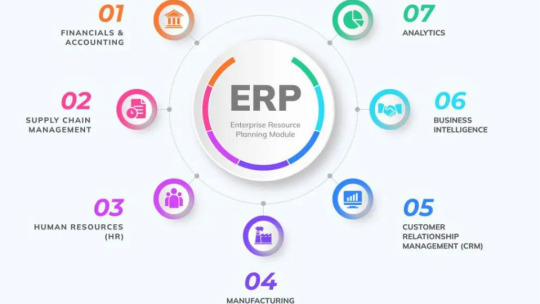
Here are five important factors to consider when evaluating ERP systems:
Platform Scalability and Flexibility
One of the most critical considerations when selecting an ERP system is its scalability and flexibility. As your business grows and evolves, your ERP solution should be able to accommodate increasing data volumes, users, and business processes. Look for a platform that offers scalability without compromising performance, allowing you to expand your operations seamlessly.
A flexible ERP system should also support customization to meet your unique business requirements. Whether you operate in manufacturing, distribution, retail, or services, the ability to tailor the ERP solution to your specific industry and workflows is essential for maximizing efficiency and productivity.
Mobile Support
In today's fast-paced business environment, employees require access to critical information and functionalities while on the go. Therefore, it's essential to choose an ERP system that offers robust support for mobile users. Mobile ERP applications empower employees to perform tasks such as accessing real-time data, approving purchase orders, and managing inventory from their smartphones or tablets.
Look for ERP solutions with responsive design and native mobile apps that provide a seamless user experience across devices. Mobile support enhances employee productivity, facilitates better decision-making, and enables organizations to remain agile and competitive in a mobile-centric world.
Customer Recommendations or Testimonials
Before making a final decision, it's advisable to seek feedback from existing customers or explore testimonials and case studies from organizations that have implemented the ERP system you're considering. Customer recommendations provide valuable insights into the implementation process, system performance, and overall satisfaction with the ERP vendor.
Reach out to industry peers or participate in user forums and discussion groups to gather first-hand experiences and recommendations. Additionally, consider conducting reference calls with potential ERP vendors to gain a deeper understanding of their track record and commitment to customer success.
Ease of Use and Contextualization
User adoption is a critical factor in the success of any ERP implementation. Therefore, it's essential to choose a user-friendly ERP system that minimizes complexity and promotes ease of use across all levels of the organization. Look for intuitive interfaces, streamlined workflows, and contextual help features that guide users through their tasks efficiently.
Furthermore, consider the ERP system's ability to contextualize data and present relevant information based on user roles and responsibilities. Personalized dashboards, role-based access controls, and customizable reporting capabilities empower users to access the information they need to make informed decisions and drive business outcomes.
Long-Term Costs
While upfront costs are an important consideration, it's equally crucial to evaluate the long-term costs associated with implementing and maintaining an ERP system. Beyond the initial license fees, consider factors such as implementation services, training, ongoing support, and upgrades.
Choose an ERP vendor that offers transparent pricing and flexible licensing options tailored to your budget and requirements. Additionally, assess the total cost of ownership (TCO) over the expected lifespan of the ERP system, factoring in expenses such as customization, integration, and system maintenance.
Selecting the right ERP system requires careful consideration of various factors, including platform scalability, mobile support, customer recommendations, ease of use, and long-term costs. By prioritizing these key considerations and conducting thorough due diligence, organizations can choose an ERP solution that aligns with their business goals and sets the foundation for growth and success.
Maximize efficiency with Noetic Labs' ERP solutions tailored to your needs. Whether you're in manufacturing, healthcare, or religious institutions, our ERP system caters to diverse sectors. Experience seamless operations with our manufacturing ERP software, streamline patient care with hospital management software, ensure accuracy in diagnostics with pathology lab software, and manage your congregation effortlessly with church management software. Elevate your organization's performance with Noetic Labs ERP solutions.
#erp software for manufacturing industry in india#erp software development company in india#erp software companies in india#custom erp software development#hospital management software in india.#custom erp software development in india#erp manufacturing software#erp software development company#erp software for manufacturing industry#erp software companies
0 notes
Text
Gujarat is a vibrant city of culture that is now growing as a hub of industries and commercial activities. Many businesses in different sectors, like manufacturing, textiles, pharmaceuticals, etc., have been thriving in this state in the past few years. To thrive and remain efficient in this region in today’s era, every business needs to start adopting Enterprise Resource Planning (ERP) software. With the utilization of the services provided by ERP software companies in Gujarat, companies can streamline operations, enhance production, and improve growth rates.
#Manufacturing ERP Software Companies in Gujarat#ERP Software Companies in Gujarat#manufacturing ERP software company in Vadodara#Gujarat#ERP software firms in Gujarat#ERP solution in Gujarat
0 notes
Text
How to Choose the Best ERP for Engineering and Manufacturing Industry
In today’s fast-paced world, engineering and manufacturing companies face increasing pressure to deliver high-quality products while maintaining efficiency and cost-effectiveness. Implementing the right Enterprise Resource Planning (ERP) software can significantly enhance operations, streamline workflows, and boost productivity. However, with numerous options available, selecting the best ERP software for the engineering and manufacturing industry can be challenging. This guide will help you navigate this decision-making process and choose the most suitable solution for your business.
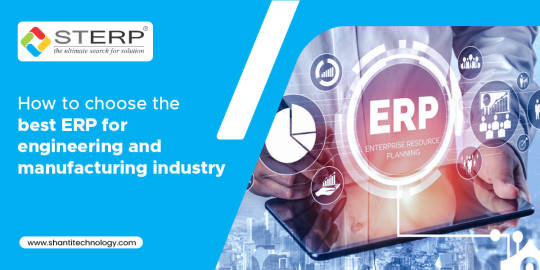
Why ERP is Crucial for Engineering and Manufacturing
ERP software integrates various business processes, including production, inventory management, supply chain, finance, and human resources. For engineering and manufacturing companies, ERP solutions are particularly vital because they:
Facilitate real-time data sharing across departments.
Enhance supply chain management.
Optimize production planning and scheduling.
Ensure compliance with industry standards.
Reduce operational costs.
Partnering with the right Engineering ERP software company ensures that your organization leverages these benefits to stay competitive in a dynamic market.
Steps to Choose the Best ERP for Engineering and Manufacturing
1. Understand Your Business Needs
Before exploring ERP solutions, evaluate your company’s specific requirements. Identify the pain points in your current processes and prioritize the features you need in an ERP system. Common features for engineering and manufacturing companies include:
Bill of Materials (BOM) management
Production planning and scheduling
Inventory control
Quality management
Financial reporting
Consulting with a reputed ERP software company can help you match your needs with the right features.
2. Look for Industry-Specific Solutions
Generic ERP software might not address the unique needs of the engineering and manufacturing sector. Opt for an ERP software in India that offers modules tailored to your industry. Such solutions are designed to handle specific challenges like multi-level BOM, project costing, and shop floor management.
3. Check Vendor Expertise
Choosing a reliable vendor is as important as selecting the software itself. Research ERP solution providers with a strong track record in serving engineering and manufacturing companies. Look for reviews, case studies, and client testimonials to gauge their expertise.
4. Evaluate Scalability and Flexibility
Your business will grow, and so will your operational requirements. Ensure that the ERP system you choose is scalable and flexible enough to accommodate future needs. The top 10 ERP software providers in India offer scalable solutions that can adapt to changing business demands.
5. Assess Integration Capabilities
An ERP system must integrate seamlessly with your existing tools, such as Computer-Aided Design (CAD) software, Customer Relationship Management (CRM) systems, and IoT devices. A well-integrated system reduces redundancies and enhances efficiency.
6. Prioritize User-Friendliness
A complex system with a steep learning curve can hinder adoption. Choose an ERP software with an intuitive interface and easy navigation. This ensures that your employees can use the system effectively without extensive training.
7. Consider Customization Options
No two businesses are alike. While standard ERP solutions offer core functionalities, some companies require customization to align with specific workflows. A trusted ERP software company in India can provide custom modules tailored to your unique needs.
8. Focus on Data Security
Engineering and manufacturing companies often deal with sensitive data. Ensure that the ERP solution complies with the latest security standards and offers robust data protection features.
9. Compare Pricing and ROI
While cost is an important factor, it should not be the sole criterion. Evaluate the long-term return on investment (ROI) offered by different ERP software. A slightly expensive but feature-rich solution from the best ERP software provider in India may deliver better value than a cheaper alternative with limited functionalities.
10. Test Before You Commit
Most ERP software companies offer free trials or demo versions. Use these opportunities to test the software in a real-world scenario. Gather feedback from your team and ensure the solution meets your expectations before finalizing your decision.
Benefits of Partnering with the Best ERP Software Providers in India
India is home to some of the leading ERP software providers in India, offering state-of-the-art solutions for the engineering and manufacturing sector. Partnering with a reputable provider ensures:
Access to advanced features tailored to your industry.
Reliable customer support.
Comprehensive training and implementation services.
Regular updates and enhancements to the software.
Companies like Shantitechnology (STERP) specialize in delivering cutting-edge ERP solutions that cater specifically to engineering and manufacturing businesses. With years of expertise, they rank among the top 10 ERP software providers in India, ensuring seamless integration and exceptional performance.
Conclusion
Selecting the right ERP software is a critical decision that can impact your company’s efficiency, productivity, and profitability. By understanding your requirements, researching vendors, and prioritizing features like scalability, integration, and security, you can find the perfect ERP solution for your engineering or manufacturing business.
If you are looking for a trusted ERP software company in India, consider partnering with a provider like STERP. As one of the best ERP software providers in India, STERP offers comprehensive solutions tailored to the unique needs of engineering and manufacturing companies. With their expertise, you can streamline your operations, improve decision-making, and stay ahead in a competitive market.
Get in touch with STERP – the leading Engineering ERP software company – to transform your business with a reliable and efficient ERP system. Take the first step toward a smarter, more connected future today!
#Manufacturing ERP software company#ERP solution provider#Engineering ERP software company#ERP software company#ERP software companies
4 notes
·
View notes
Text
ERP Software for Manufacturers in Mumbai – Growthawk
Growthawk offers top-tier ERP software for manufacturers in Mumbai, designed to optimize production, enhance efficiency, and streamline operations. Our ERP solutions integrate essential business functions, including production planning, inventory management, and quality control, ensuring seamless workflow and data accuracy. With advanced automation and real-time insights, manufacturers can reduce downtime, improve resource allocation, and maximize profitability. Growthawk’s ERP software is tailored to meet the unique challenges of the manufacturing industry, providing scalable and customizable solutions. Upgrade your manufacturing processes with Growthawk and drive business growth with cutting-edge ERP technology. Contact us today for a free consultation!
For More details visit our website: https://erp.growthawk.com/small-manufacturing
0 notes